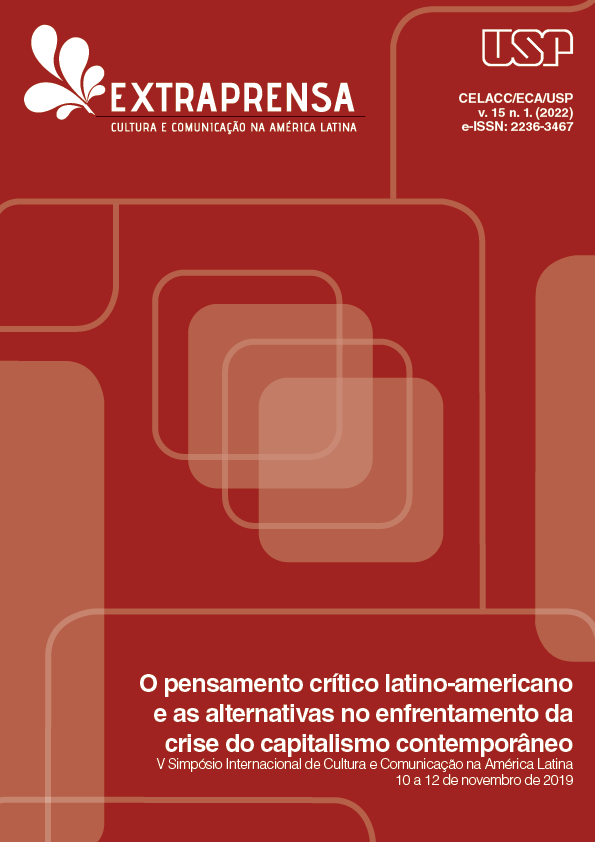Colorful favored life: I'll tell you, life in the favela is not easy!
DOI:
https://doi.org/10.11606/extraprensa2022.193433Keywords:
Social integration, Classical music, Orchestras, Pandemic, Social networkingAbstract
Based on our shared teaching experiences in the classroom with teachers and 7th grade students from a municipal school, we highlight the affinities between the narratives of the rappers’ video clips from the territory of the surrounding communities and the experiences of young people, in order to enhance critical reflections and sensitive writing to the painful experiences that affect them as subjects. By proposing video clips, such as “Where I come from” (Edi Rock and Mc Pedrinho, 2019), we witness the awakening of an Aphrodiaspora memory and the writing of raps by the students themselves about the meaning of their origins, as a strategy for denouncing and fighting against to race and class inequalities. We propose a reading of this experience from the aesthetic points of view (BENJAMIN, 1980; ADORNO, 1986), of the territory (SANTOS, 1998, 2009) and of an engaged narrative, present in the literature (JESUS, 2020; HOOKS, 2017) and rap poetry.
Downloads
References
ADORNO, Theodor W. Notas sobre o filme. In: COHN, Gabriel. Theodor W. Adorno. São Paulo: Ática, 1986, p.100 -107.
ADORNO, Theodor W. Educação e emancipação. Rio de Janeiro: Paz e Terra, 1995.
BENJAMIN, Walter. A obra de arte na época de suas técnicas de reprodução. In: BENJAMIN, Walter; HORKHEINER, Max; ADORNO, Theodor W.; HABERMAS, Jürgen. Textos escolhidos. Walter Benjamin, Max Horkheimer, Theodor W. Adorno, Jürgen Habermas. Tradução de J. L. Grünnewald. São Paulo: Abril Cultural, 1980, p. 3-28. (Os pensadores).
BENJAMIN, Walter. Uma leitura da tese “sobre o conceito de história”: Tese VII. In: LOWY, Michael. Walter Benjamin: aviso de incêndio. São Paulo: Boitempo, 2005, p.70.
BÉTHUNE, C. Le rap - une esthétique hors de la loi. Paris: Autrement, 2003.
BRASIL. Lei nº 10.639, de 9 de janeiro de 2003. Altera a lei nº 9.394, de 20 de dezembro de 1996, que estabelece as diretrizes e bases da educação nacional, para incluir no currículo oficial da rede de ensino a obrigatoriedade da temática “História e Cultura Afro-brasileira”, e dá outras providências. Brasília, DF: Presidência da República, [2003]. Disponível em: http://www.planalto.gov.br/ccivil_03/leis/2003/l10.639.htm. Acesso em: 16 outubro. 2021.
CONTIER, Arnaldo. O rap brasileiro e os Racionais MC’s. In: Anais do 1 Simpósio Internacional do Adolescente, May 2005. Disponível em: http://www.proceedings.scielo.br/scielo.php?pid=msc0000000082005000100010&script=sci_arttext. Acesso em: 16/10/2021.
DE ONDE eu venho. Produção DJ Kalfani, DJ Cuca. Compositores: Intérpretes Edi Rock e MC Pedrinho. Rio de Janeiro: Som Livre, 2019. 1 videoclipe. (3 min.). Disponível em: https://www.youtube.com/watch?v=LBYGLqrvRc4. Acesso em: 12/12/2021.
EDWARDS, Paul. How to rap. Chicago: Chicago Review Press, 2009.
HANSEN, Miriam Bratu. Cinema and experience: Siegfried Kracauer, Walter Benjamin, and Theodor W. Adorno. Berkeley, Los Angeles, London: University of California Press, 2012.
HOOKS, Bell. Ensinando a transgredir: a educação como prática da liberdade. São Paulo: Martins Fontes, 2017.
JESUS, Carolina Maria de. Quarto de despejo. 10 ed. São Paulo: Companhia das Letras, 2020.
MIL faces de um homem leal (Marighella). Direção: Daniel Grinspum. Intérpretes: Racionais MC’s. São Paulo: Preta Portê Filmes, 2012. 1 videoclipe (6 min.). Disponível em: https://www.youtube.com/watch?v=5Os1zJQALz8. Acesso em: 12/12/2021.
SANTOS, Milton. O retorno do Território. In: SANTOS, Milton et al. (Org.). Território: Globalização e Fragmentação. 4 ed. São Paulo: Hucitec: Anpur, 1998, p. 15-20.
SANTOS, Milton. A Natureza do espaço: Técnica e Tempo, Razão e Emoção. São Paulo: EDUSP, 2009.
SOBREVIVENDO no inferno. Racionais Mc’s. São Paulo: Cosa Nostra, 1997. 1 CD. Disponível em: https://www.youtube.com/watch?v=fVQ3YYnic2o&t=1s. Acesso: 12/12/2021.
SODRÉ, Muniz. Descolonizando. Folha de São Paulo, São Paulo, 17 out. 2021. Editoriais, p. A2.
Downloads
Published
Versions
- 2022-10-14 (2)
- 2022-05-31 (1)
Issue
Section
License
Copyright (c) 2022 Mônica Amaral, Marina Nunes Dias, Robson Guarnieri dos Santos

This work is licensed under a Creative Commons Attribution-NonCommercial-NoDerivatives 4.0 International License.
Ao submeter qualquer material científico para Extraprensa, o autor, doravante criador, aceita licenciar seu trabalho dentro das atribuições do Creative Commons, na qual seu trabalho pode ser acessado e citado por outro autor em um eventual trabalho, porém obriga a manutenção de todos os autores que compõem a obra integral, inclusive aqueles que serviram de base para o primeiro.
Toda obra aqui publicada encontra-se titulada sob as seguintes categorias da Licença Creative Commons (by/nc/nd):
- Atribuição (de todos os autores que compõem a obra);
- Uso não comercial em quaisquer hipóteses;
- Proibição de obras derivadas (o trabalho não poderá ser reescrito por terceiros. Apenas textos originais são considerados);
- Distribuição, exibição e cópia ilimitada por qualquer meio, desde que nenhum custo financeiro seja repassado.
Em nenhuma ocasião a licença de Extraprensa poderá ser revertida para outro padrão, exceto uma nova atualização do sistema Creative Commons (a partir da versão 3.0). Em caso de não concordar com esta política de Direito Autoral, o autor não poderá publicar neste espaço o seu trabalho, sob pena de o mesmo ser removido do conteúdo de Extraprensa.







